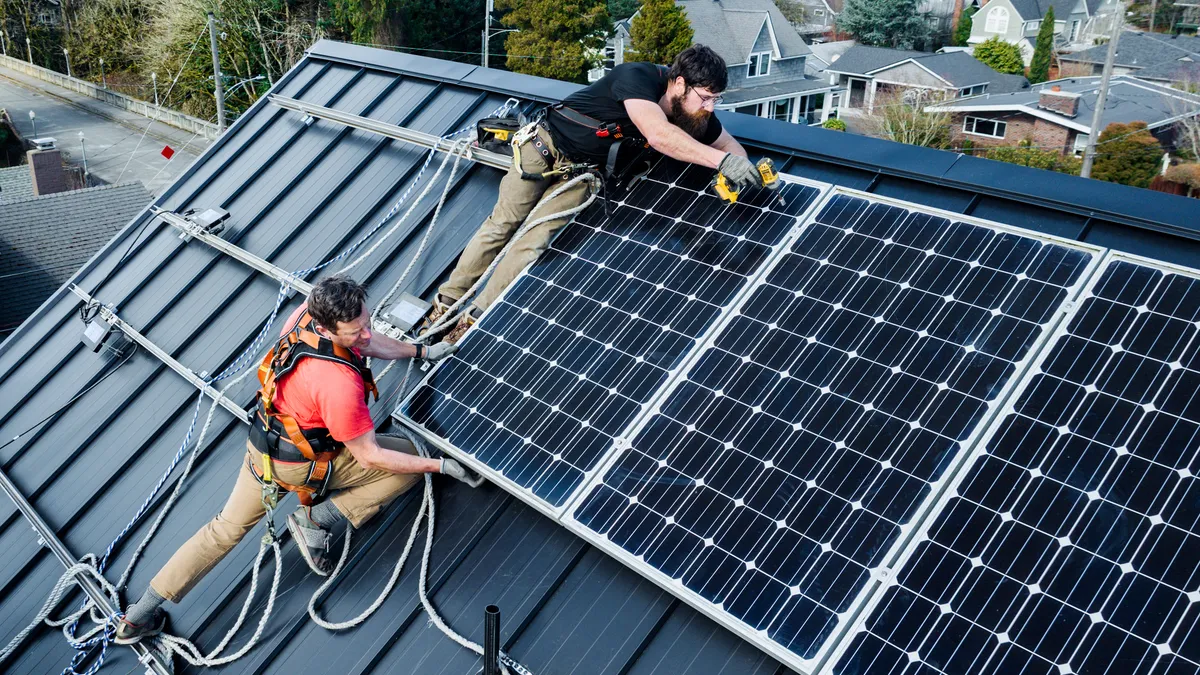Dive Brief:
- Recheck, a registry aimed at solar financiers who want to vet the credentials of their industry partners, launched Thursday in partnership with the Solar Energy Industries Association and a group of residential solar financing companies.
- Recheck and SEIA said in a joint release that they aim to work in tandem to drive adoption of the registry’s Recheck IDs and SEIA’s upcoming ANSI-accredited Consumer Protection Standard, which SEIA plans to release for public review in the third quarter of this year.
- “Because we are building such a big coalition, we hope that the near-term scenario is that it’s very inconvenient for somebody who is trying to take advantage of people – that it becomes very difficult for them to worm their way into the system,” said Recheck cofounder and CEO Tim Trefren.
Dive Insight:
Trefren said that the idea for Recheck arose in part from the experiences of cofounder Chris Collins, who had worked in and around the solar financing industry and was familiar with the growing problem of misconduct in the solar sales process — and how it was “really harming the reputation of the industry.”
As the residential solar market has boomed, with nearly 7 GW installed in 2023, solar misinformation and scams have increased. The Energy Trust of Oregon, a nonprofit, says that complaints about solar panel installation “have gone up 1200% nationwide since 2018.”
The Inflation Reduction Act has given scammers additional opportunities to provide misleading information, said Cameron Starr, the senior customer experience operations manager at Energy Trust.
The impact on how consumers view the solar industry can be “very negative,” Starr said, “and it's very unfortunate, because there's a lot of really good, reputable contractors and organizations that are helping customers install solar.”
But Starr said he’s also familiar with tactics like high-pressure sales, scams where door-to-door salespeople falsely claim to work with a utility or contractor, or misleading promotions of tax credits to customers who don’t actually qualify due to their lack of tax liability.
Starr said that he thinks consumer protection measures are "always very important" and noted that Energy Trust has installation guidelines requiring trade allies to enroll in their Trade Ally Network to access solar funding.
Recheck’s registry isn’t currently tailored for consumer use, though consumers are able to look up solar salespeople and installers if they know their Recheck ID. In its current form, Recheck is aimed at “contractors, financiers, and technology platforms” who want to confirm that their partners meet certification, licensing and training requirements, the release said.
The company’s founding partners include solar financiers Dividend Finance, Freedom Forever, GoodLeap, Mosaic, Palmetto, Sungage Financial, Sunlight Financial and Sunrun.
“One of the biggest problems here is that these finance companies have historically all operated in a silo,” Trefren said.
As a result, he said, a finance company might end its relationship with a solar installer or a salesperson who is “cutting corners or taking advantage of people,” but that person can then move on to a new company — with “all that information about misconduct behind the walled garden of the other finance company.”
Recheck’s goal is to provide a mechanism for companies to share information about misconduct and limit the damage that can be done by repeat bad actors, Trefren said. The “biggest touchstone” for the company as it developed its system was to ensure fairness, compliance and accuracy, he said — “the worst thing in the world would be misattributing misconduct from person A to person B.”
Trefren said that the company’s mission is to address issues of public perception that are slowing down the clean energy industry.
“The vast majority of people are in it for the right reasons, and they're fired up about solar and they want to help,” he said. “But there are a small number of people that are out there taking advantage of, often, the most vulnerable people.”
Recheck has been collaborating with SEIA since late last year, Trefren said, and the company is “really excited” to provide a distribution channel for their new standards.
“I think [lack of trust] is a problem that could get worse, and we want to help the industry come together and stop it in its tracks,” he said.
Correction: We have updated this article to to correct comments from Cameron Starr of Energy Trust about consumer protection.















